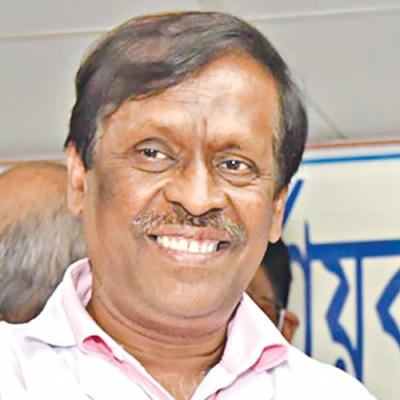Dreams dashed

Reputed scientist Dr Bijon Kumar Sil is leaving Bangladesh for Singapore today with a heavy heart.
He is undecided whether to come back, but said he wants to return.
"I have been frequently travelling between Bangladesh and Singapore. But this time, I feel sad. I was not informed whether or not I will not get a work permit [in Bangladesh]. The reason why I feel dejected is that we created a Covid-19 test kit, but we are yet to get approval. At the same time, I assumed that I would get my work permit in a short time," he said in a frustrated tone.
The Gono University authorities said they applied for a work permit for Dr Bijon and submitted all the documents needed.
Another point is that once a work permit is given, the recipient has to leave Bangladesh and complete the visa procedure and then they can enter the country.
So, it is a procedural requirement for Dr Bijon to leave the country.
But Gono University and Gonoshasthaya Kendra do not want him to leave.
"Gono University has submitted necessary documents for a work permit and we are assuming that it will take some time to complete the process. I am fully respectful to the due process and regulations," he said.
Dr Bijon said he was born and grew up in Bangladesh, but currently he is a citizen of another country.
"I'm a citizen of Singapore but Bangladesh is my birthplace. I don't want to even think that I will not get permission to work in the country where I was born."
He said it is not money he is after. "I want to work in my motherland. If I get a work permit, then I have to submit the documents to the Bangladesh Embassy in Singapore. They will then give me an employment visa. I can then return."
He said if Gonoshasthaya Kendra gets approval then they can go for production of antigen and antibody test kit.
"My presence may be needed. If I can't be here, I will try to cooperate from Singapore."
Bijon's wife and two children live in Singapore. He has worked in the laboratory of Gonoshasthaya Kendra for the last seven months with his colleagues. He could not go to Singapore due to the pandemic.
He still believes that the government will approve the antigen and antibody test kits he developed. He wants to stay in Bangladesh during the production.
"I do believe we will get approval because our kit is unique. Through our antibody kit, we can examine whether antibodies and neutralising antibodies were created in someone's body."
Dr Bijon said if neutralising antibodies are created in the body, the person does not need any vaccine. "We cannot vaccinate 17 crore people. Another point is that we have to see whether neutralising antibodies are created in the human body after vaccination. If antibodies are not created then the vaccine is ineffective."
He stressed the need for antibody testing as a vaccine alone will not help in getting rid of the coronavirus.
Dr Bijon said the procedure for patent of Gonoshasthaya Kendra's testing kit has already been completed.
He said many countries in the world have already developed rapid test kits and started using them, although Bangladesh was the first country that made an announcement of it.
Sources at Gonoshasthaya Kendra said some countries have already shown interest in producing the kit but the organisation wants to wait.
"We invented it first but could not release it in the market. I have to endure this disappointment for the rest of my life. But the good news is that we completed the patent. Other countries cannot produce our kit. From the beginning, some countries showed interest in going for production and they still want that.
"Dr Zafrullah Sir always wanted the people of the country to get the benefits of the kit at a minimum cost. But if we don't get approval, we may consider the alternatives."
Gonoshasthaya Kendra, in the second week of March, announced the development of Dr Bijon Kumar Sil's antigen and antibody test kit. Then the organisation applied to the Directorate General of Drug Administration (DGDA) for approval. Many started saying that rapid test kits are not approved by the World Health Organization and no country in the world is using the kits.
On June 17, Bangabandhu Sheikh Mujib Medical University gave the antibody test kit report. Before that, the antigen test kit examination was suspended for a few technical errors. Gonoshasthaya Kendra submitted the antigen test for approval to the authorities concerned again.
BSMMU results showed that antibody kits are successful in 70 percent of the cases. DGDA suggested improving the quality of the kit, and did not give approval.
Gonoshasthaya Kendra and Dr Bijon improved the quality of the kit but the procedure of testing the effectiveness of it for the second time is still pending.


 For all latest news, follow The Daily Star's Google News channel.
For all latest news, follow The Daily Star's Google News channel. 



Comments